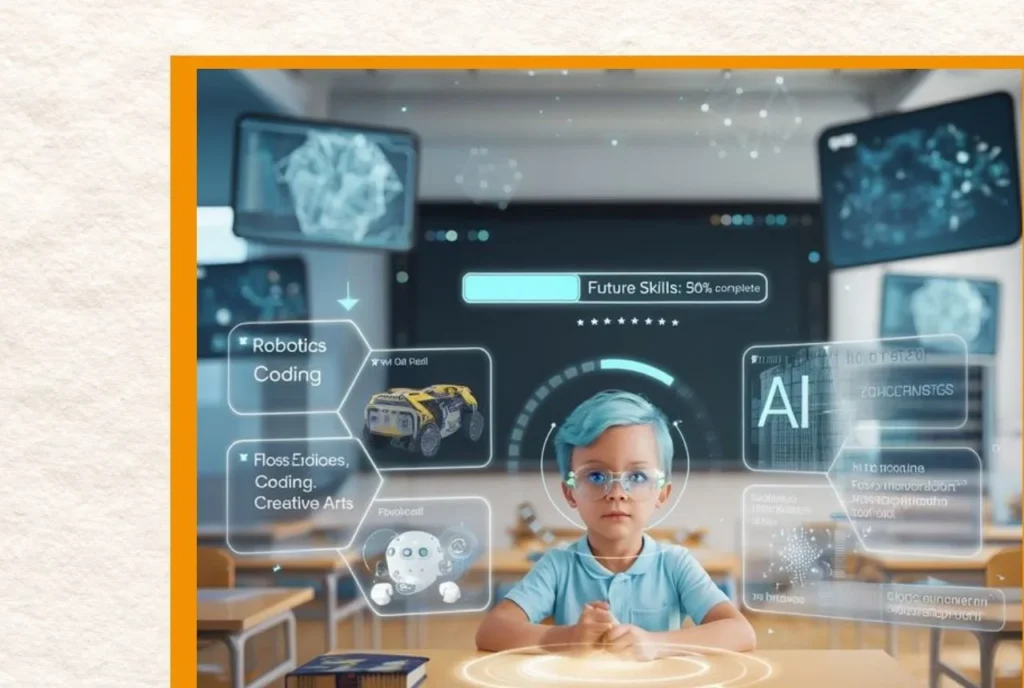In today’s technology-driven world, understanding why schools should start teaching coding early is crucial—because digital literacy is no longer optional, it’s essential. With smartphones, smart devices, and AI shaping the way we live and work, it’s clear that coding is becoming as foundational as reading, writing, and math.
Teaching coding from an early age isn’t just about preparing children for tech careers; it’s about equipping them with vital life skills.
This blog explores why schools should start teaching coding early, especially at the primary and middle school levels, and highlights five compelling benefits that go far beyond just technical knowledge.
Why Schools Should Start Teaching Coding Early
Why schools should start teaching coding early is a question rooted in the evolution of modern education. As the world becomes increasingly digital, coding is emerging as a new literacy—just as essential as numeracy or language. From automating simple tasks to developing software and apps, coding touches almost every aspect of daily life and the future workforce.
Introducing coding in primary and middle school unlocks cognitive development at the right age. Studies show that young minds are more adaptable and absorb abstract concepts more easily, making this the perfect time to introduce logical thinking and basic programming skills.
Contrary to the misconception that coding is too complex for young children, tools like Scratch, Blockly, and robotics kits provide fun, interactive ways to learn code. Early coding also builds essential 21st-century skills such as logical reasoning, problem-solving, creativity, and teamwork.
At the forefront of this educational shift is International School Guwahati, one of the leading CBSE schools in Assam, offering a comprehensive coding curriculum that prepares students for tomorrow’s digital challenges. Their approach shows how early exposure to coding can be engaging, educational, and transformative.
5 Benefits of Learning Coding Early
1. Enhances Problem-Solving and Logical Thinking
One of the greatest strengths of early coding education is how it sharpens a child’s ability to solve problems logically. Understanding why schools should start teaching coding early lies in the fact that coding requires students to break down a larger task into smaller, manageable parts—just like solving a puzzle. This methodical approach cultivates what educators call “computational thinking.”
As students write and debug code, they learn to identify patterns, anticipate errors, and develop efficient solutions. These skills are not only critical in computer science but also enhance performance in subjects like mathematics and science.

For example, in a classroom coding activity using Scratch, students might be tasked with building a simple animation. They’ll need to plan the sequence of events, decide how characters will move, and correct any errors in logic or timing. Through this iterative process, students naturally develop stronger analytical skills.
This is a key reason why schools should start teaching coding early—because it builds essential problem-solving and logical reasoning abilities from a young age. At International School Guwahati, coding challenges are carefully structured to enhance critical thinking in a progressive manner. This way, students gain confidence in breaking down problems and constructing logical solutions from an early age.
2. Boosts Creativity and Innovation
Many people mistakenly view coding as a dry, technical subject—but it’s actually a powerful outlet for creativity. Young coders can design games, build interactive stories, or even create simple apps. Each of these activities requires imaginative thinking, storytelling, and design skills.
Learning to code encourages children to think like creators rather than consumers. They begin to see technology as a tool they can shape and control. This mindset fosters innovation, as students experiment with new ideas and discover that they can bring their visions to life using code.

For example, a student might create a digital comic strip with animated characters using a block-based platform like Scratch. In doing so, they learn about sequences, timing, design, and user interaction—all while expressing their own ideas.
International School Guwahati integrates such creative coding projects into their curriculum to nurture innovation from a young age. This approach not only builds technical skills but also inspires confidence and imagination—skills that are critical in any profession.
3. Builds Perseverance and Resilience
Coding is rarely perfect on the first try—and that’s a good thing. One of the most valuable lessons young learners gain from coding is how to handle failure. Debugging a program teaches persistence, patience, and a willingness to try again, even after repeated setbacks.
This trial-and-error process helps children develop a growth mindset. They come to see mistakes not as failures, but as opportunities to learn and improve. When a block of code doesn’t work as intended, students learn to troubleshoot systematically and seek alternative solutions.

Take the case of a group project at International School Guwahati where students had to build a working chatbot. Initial attempts were flawed—some bots wouldn’t respond correctly, while others crashed entirely. But with encouragement from teachers and collaborative problem-solving, the students refined their code and succeeded. The experience taught them grit, teamwork, and the importance of learning from challenges.
By learning to code, students are equipped with resilience—an invaluable life skill in both academic and real-world situations.
4. Improves Collaboration and Communication Skills
While coding is often seen as a solitary activity, many projects in school settings are highly collaborative. Group coding assignments help students learn how to divide tasks, explain ideas clearly, and provide constructive feedback.
Coding education often includes activities where students must work together to create apps or solve programming puzzles. In such settings, effective communication is crucial. They must articulate their logic, listen to teammates, and make group decisions—skills that are transferable across all disciplines.

At International School Guwahati, collaborative coding sessions are a regular part of the curriculum. Students might team up to develop a mobile app prototype or create a shared digital story. This teamwork not only enhances the final product but also develops soft skills that will benefit them in any career.
By fostering an environment of shared learning and communication, early coding education ensures students are not just tech-savvy but also socially equipped for future workplaces.
5. Prepares Students for Future Careers and Digital Literacy
In a world where automation, AI, and data science are rapidly evolving, coding is becoming a foundational skill for countless careers—not just in IT, but in finance, healthcare, media, and beyond. Starting early gives students a significant head start.
Learning to code helps children understand the technology shaping their world, making them more informed digital citizens. It demystifies complex systems and encourages curiosity about how things work. This digital literacy is essential for navigating and contributing to an increasingly tech-driven society.

Moreover, early exposure helps break down stereotypes. Coding is for everyone—boys and girls, artists and mathematicians. When introduced early, it builds confidence and curiosity before self-doubt or social labels interfere.
International School Guwahati plays a key role in this by offering gender-inclusive, hands-on coding programs. By empowering students with early coding skills, the school prepares them not just for jobs of the future, but for a deeper understanding of the digital world they live in.
How Schools Can Effectively Introduce Coding Early
To introduce coding early, schools should begin with age-appropriate tools like Scratch, Code.org, or educational robots that turn coding into a fun, interactive experience. Unplugged activities that teach logic and sequencing without screens are equally important for younger children. Gamified learning keeps students engaged, and integrating coding into science or math lessons makes it more relatable.
Equally critical is teacher training and creating a supportive environment where experimentation is encouraged. International School Guwahati is a shining example, offering structured, engaging, and inclusive coding education that equips students with 21st-century digital skills from a young age.
Final Thoughts
Understanding why schools should start teaching coding early is vital in today’s digital era. Early coding education enhances problem-solving, creativity, perseverance, collaboration, and career readiness. It’s a foundational skill that benefits students far beyond the classroom.
Schools like International School Guwahati are leading the way—proving that with the right approach, coding can empower every child for a brighter future.
